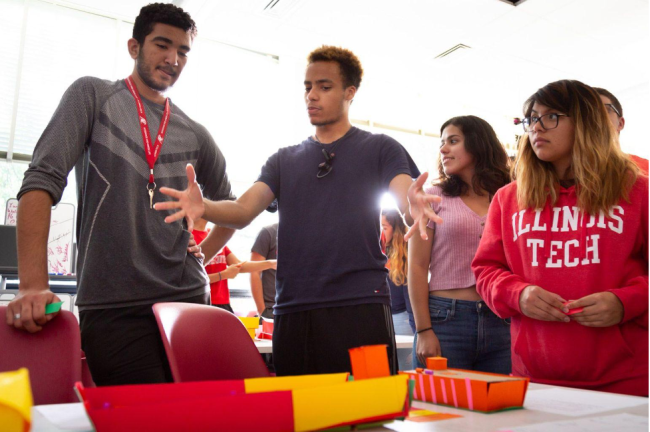You have /5 articles left.
Sign up for a free account or log in.

Illinois Institute of Technology students can opt in to Discover+ to engage in multidisciplinary learning before selecting a major.
Illinois Institute of Technology
Illinois Institute of Technology is expanding its opportunities for students who are undecided on their major to explore career paths and stay on track toward graduation.
The Discover+ program was designed to support students in exploring their interests, preparing for advanced math and calculus requirements, and trialing multidisciplinary learning at Illinois Tech. The three career tracks and layered support services promote success throughout a student’s first two years at the university.
What’s the need: Historically, Illinois Tech has required advanced math and calculus courses from its incoming first-years, but this excluded a significant number of applicants, particularly those with underrepresented minority identities. Only 19 percent of high school students in the U.S. complete calculus in high school, and this number shrinks more among high schools serving URM students.
“We really do believe that it’s our responsibility as an institution to educate students from all backgrounds,” says Fareine Suarez, assistant vice president of undergraduate admissions at Illinois Tech.
The Discover+ initiative closes equity gaps in enrollment, allows for career exploration early in a student’s college career and increases multidisciplinary major opportunities.
Institutional survey data showed that accepted students sometimes would choose not to enroll at the university because they were undeclared in their major, or students would transfer out during their first or second year to pursue a different major not offered at Illinois Tech.
Nationally, around 35 percent of students who declared a major in sciences, technology, engineering or math, and about half of math majors, change their field of study within three years, according to data from the U.S. Department of Education.
“We wanted to give students more of an opportunity and say, ‘It’s OK for you not to know what you want,’” Suarez explains. Administrators also recognize that technology careers are evolving with the changing landscape of tools, like artificial intelligence, which demands students be equipped with different and diverse skill sets.
How it works: Any first-year student who does not designate a major when enrolling at Illinois Tech can join the Discover+ program until they declare a concentration.
Students are matched with a peer mentor, an academic adviser and a major adviser to support them through interest and career exploration.
Within Discover+ there are three tracks, each of which guarantees direct admission to an academic program when the student opts in to a major, so long as they maintain good academic standing. The tracks are Arts and Innovation, STE(A)M, and Tech+.
“What these three tracks provide for students is a clear guidance on opportunities they would have after the Discover+ program, so they don’t get the discomfort that they are choosing something that they don’t know that they will like,” says Mallik Sundharam, vice president for enrollment management and student affairs.
Students in the Arts and Innovation track receive direct admission into majors that include behavioral health and wellness, game design and experiential media, marketing analytics, and information technology and management.
STE(A)M students must complete a math course to receive admission into STEM programs such as majors in the college of engineering, college of computing programs, financial economics, finance, biology, chemistry, physics, food science and nutrition. Another option is to forgo math and opt in to architecture.
Tech+ is still under development, but will engage students in multidisciplinary learning. These majors combine programs—computer science and business administration, economics and cybersecurity, engineering and architectural studies, for example—and are available to students who don’t declare a major until their third year.
“What we are trying to do is break the silos of the colleges and create what we call tech-enabled curriculum in every part of the [institution] … which will widen availability of students who choose to explore those futuristic careers,” Sundharam says.
After declaring a major, students begin meetings with their college-specific adviser to complete courses in their degree programs.
Next steps: Discover+ will launch officially in the fall with the incoming first-year class.
To prepare for the new program, Illinois Tech is streamlining its advising process and implementing a universal platform for all departments.
The university also engages in student journey mapping—identifying which touch points students are hitting as they move through their time at the institution to make them most successful—and sharing those journeys with students as a support measure.
If your student success program has a unique feature or twist that you believe is worth modeling, we’d like to know about it. Click here to submit.








